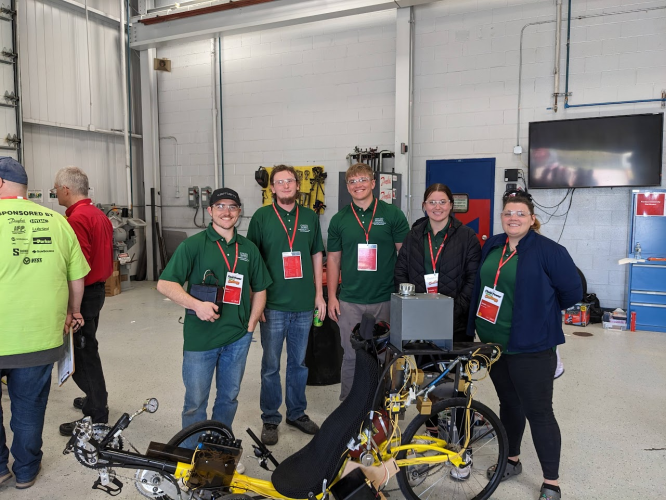
Russ College students win prize for best teamwork in the Fluid Power Vehicle competition

Engineering Technology and Management (ETM) students Evan Adams, Luke Chapman, Jessie Logan, Kristin Shuster and Connor Stonerock participated in the Fluid Power Vehicle Challenge in April 2023, earning the prize for the event’s best teamwork.
Hosted by the National Fluid Power Vehicle Association, the Fluid Power Vehicle Challenge (FPVC) is a competition in which students combine hydraulics and pneumatics to design a vehicle to compete in different races. The Russ College of Engineering and Technology hosted a team led by Michael Kennedy, assistant professor of instruction in the Department of Engineering Technology and Management.
Students in ETM study both hydraulics and pneumatics and gain hands-on experience in the Parker Hannifin hydraulics lab in Ohio University’s Stocker Center. The FPVC, however, allows students to gain additional practical experience while developing a hydraulic bike.
“The greatest challenge of building a hydraulic bike this year was that we had very little experience when we first started. Most of the other teams in this competition have been competing for several years now, and this was the first time Ohio University had taken a bike to the competition,” Stonerock said.
Through various prototypes and experimentation, the team was able to troubleshoot challenges that arose while building the bike. They implemented engineering principles to figure out the required rotations per minute (RPMs) the motor needed to maximize the efficiency of the system. They also needed to design, manufacture and install custom-made components of the bike, which gave them hands-on experience to replicate a similar process in their careers after graduation.
When the team completed their bike, they were ready to compete against universities across the nation in the FPVC. To test each vehicle, teams competed in four different races: a sprint race, an efficiency race, an endurance race and a regen race. The sprint race was a drag race, which tested the overall speed of the vehicle. The efficiency race measured how far the vehicle could travel based on the pressure stored in the accumulator, a chief component of a hydraulic bike. The endurance race was a fifteen-minute race around a track to see how far the vehicle was able to travel in the timeframe. Lastly, the regen race tested the regenerative braking capabilities of the bike, which was a measure of how much pressure the vehicle can build up going down an incline and how the pressure moves the vehicle. In addition to the technical challenges, there was also a presentation and design rating element of the challenge. The scores in each category were tallied to determine the winners of the competition.
While the Russ College team did not place in the competition, they were recognized for their collaborative synergy, taking home the prize for the event’s best teamwork.
“Our team dynamic was special in the sense that we had multiple people that were willing to do whatever was necessary to get the bike working. We were also able to move around to different types of work, depending on what the bike needed. Our team was also willing to put in a lot of extra time aside from classwork and other activities to make the bike functional,” Stonerock said.
In every stage of the competition and the preparation, Adams, Chapman, Logan, Shuster and Stonerock worked together, embraced one another’s strengths and developed new skills to create a functioning bike that was able to compete at a national level.
“After all the time and effort spent on the bike, the sense of accomplishment and relief when the bike made its official first voyage was nearly unmatched,” Stonerock said.